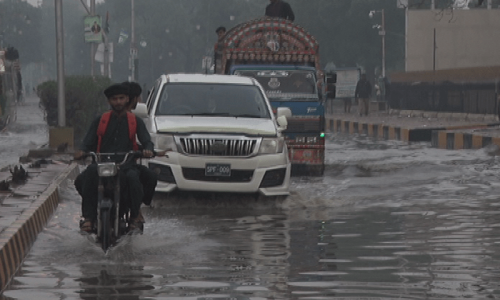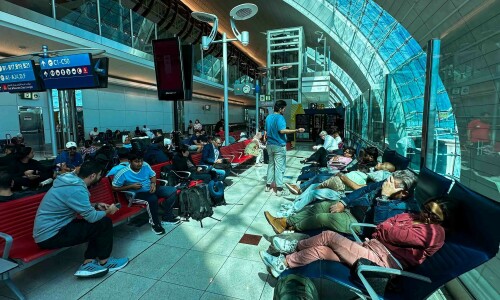LAHORE: As Lahore’s smog levels crossed 550 on the Air Quality Index — signified as hazardous — environmental experts and activists both express their dismay and horror at what is to unfold further.
According to some instruments installed in Lahore, the Gulberg area even recorded 600 AQI. The last level of ‘hazardous’ on the AQI is shown as between 250 to 300 which necessitates the people with heart and lung diseases, older adults and children should remain indoors and keep activity levels low. All outdoor physical activity must be avoided, says the index.
Imran Khalid, who holds a PhD in Environmental Policy, says that in cooler weather (autumn and winter), the warm air does not allow the cooler air underneath to rise which leads to visible smog and this is what is being witnessed in Lahore and even as far as Islamabad.
“Some of the sources for this smog include vehicular pollution with very poor fuel quality being used along with lack of pollution control technologies in our vehicles, industrial pollution, burning of municipal and even industrial waste and brick kilns which again use dirty fuel such as rubber tyres,” says Khalid who also heads the Environment and Climate Change Department at the Sustainable Development Policy Institute, Islamabad.
Traffic, industry, agriculture major polluters with 43, 25 and 20pc share, respectively
He believes the situation during this time of the year is made worse by crop stubble burning and depending on the wind direction, the pollution from either side of the border with India can indeed affect the neighbouring country.
However, he adds, it is important to remember that research shows that the key sources of air pollution in Pakistan are local in nature.
“A number of national and provincial level laws exist to address our exceedingly poor air quality but implementation is lacking. In fact, we do not have sufficient number of monitoring devices to monitor the air pollution levels in real time. This has led to a growth in the number of private, hand held monitors that have been deployed by the Pakistan Air Quality Initiative (PAQI), for example. Moreover, the US Embassy has also brought in its own monitors and placed them at the Embassy and associated Consulates.”
Mr Khalid points out that there is a clear lack of political will to move forward with the recommendations of the smog commission or to address the issues raised by the citizens in the climate march.
Sectoral Emission Inventory for Punjab shows that the major portion of air pollution emissions are coming from the transport sector and it holds 43pc share in all sectors (power, industry, transport, and crop burning residue). The second major pollutant is industry whose share is 25pc while the third major pollutant is agriculture which accounts for 20pc. Collectively, the main sectors creating air pollutants and emissions are power, industry and transport which have 80pc contribution to emissions and pollution, from which Punjab’s photochemical smog conditions arise.
The R-Smog report, prepared by the Agriculture Department and United Nations Food and Agriculture Organisation (UNFAO), clearly states that winds are westerly in winter time. So there is little chance of crop burning smoke coming from India.
Meanwhile, there is general disappointment at the government’s indifference to the issue.
Aysha Raja, a civil society activist, wants to bring attention to a letter written by Climate Action Now Pakistan to the National Assembly Standing Committee on Climate Change, headed by Munazza Hasan, requesting that they hold refineries accountable for not upgrading to Euro 4, despite collecting 100 of billions of rupees in “Deemed Duty” since 2004.
“As citizens, it is our right to ask our government representatives to hold big polluters accountable,” she says.
Another activist adds that whenever the subject is brought up, the government deflects from answering and tries to bring attention to bring electric cars.
Mueed Qureshi, an engineering expert, says generally Pakistan imports crude oil at standard international rate per barrel.
“Our local refineries produce the final vehicular fuel, and they raise or lower prices according to international rates,” he says. “And yet they only provide Euro 2 compliant fuel whereas in advanced countries their refineries provide Euro 4 compliant fuel. Our refineries don’t offer better quality to the market and yet draw the same benefits.”
Dr Imran Khalid says that addressing the fuel quality issue would be key to long-term solution to our air pollution woes.
“In the meantime, the health of our most vulnerable sections of society such as children, the elderly, and others who live in dire circumstances are directly under threat,” he warns.
Published in Dawn, November 1st, 2019
















































